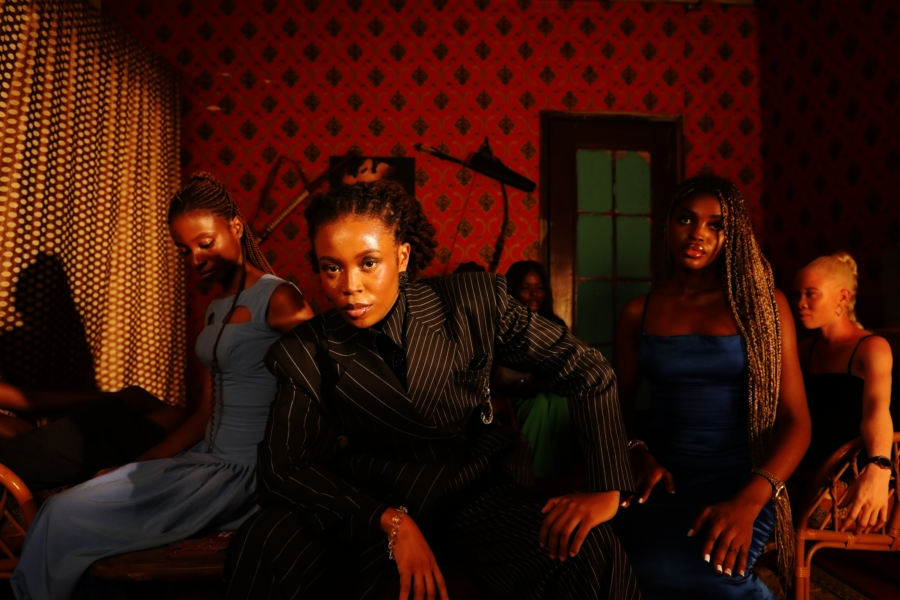Lady Donli, born Zainab Elizabeth Donli, might not be one of the most popular Nigerian artistes of the moment. Despite that, she is still one of the few artists who have spanned a decade in the music industry, with some of her first songs released in 2014.
The first time I listened to Lady Donli’s music, her style reminded me of the ‘Lijadu Sisters’ — the identical twin sisters from Nigeria who mixed Afrobeat sounds with jazz and disco from the mid-1960s to the 1980s. In contrast, she infused R&B, Punk, Afrobeats, and Jazz to create a fusion — built on organised chaos — into flourishing alté sound.
To focus solely on music, she moved from Abuja to Lagos, Nigeria’s vibrant entertainment hub, in 2017. After her debut album, ‘Enjoy Your Life’ in 2019, Lady Donli’s confidence in her artistry skyrocketed, releasing multiple singles and one EP — Wild, in 2021.
In her latest offering – sophomore project – ‘Pan African Rockstar’, Lady Donli collaborates with London-based Nigerian Afro-fusion singer Obongjayar, Kah-Lo, Congolese-Canadian musician Pierre Kwenders and The Lagos Panic – the 6-piece Afro-rock band founded by Lady Donli herself.
She once shared in an interview about her interest in making music that helps people grow their confidence, which is evident in some of the tracks on the album.
The album opens with a chest-thumping rage on ‘Number 1 Motherfucker’. It’s a ridiculous mesh of folk and Afrobeat. The chants, melody, and production combine for a stunning composition that spotlights the song. She re-introduced herself with a self-assured confidence as the only undisputed Number 1 Motherfucker. Lady Donli pulls listeners into another dimension on the upbeat song – ‘Hello Lady’. She tells an engaging story with intricate beats and groovy instrumentals – showcasing her youthful exuberance and being high on life.
“E no easy, e no easy at all” are the first words listeners hear on “Pan African Rockstar.” In this eponymous song, Lady Donli moves from an energy-giving mood to a song that mirrors the heart-wrenching experiences in the music industry, especially with the kind of music she makes. ‘If I vex, I fit be a pop star’ sends a strong message to naysayers who might be doubting her versatility but instead, she chose the style and needs no conviction to create music for public validation and mainstream acceptance.
If there is only one thing Lady Donli knows how to do best, it’s her ability to collaborate seamlessly with other artistes. On ‘Your Fantasy’, the synergy between her and the Nigerian singer/songwriter Kah-Lo elevates the storytelling to new heights where she responds to critics in the music industry and affirms her determination to lead life according to her preferences.
The flow continues on ‘Nothing2Something’ with the London-based Nigerian artiste, Obongjayar, addressing a poignant issue by shedding light on the harsh reality of police harassment experienced by many in Nigeria. In the Fela Kuti esque style on ‘My Ability’, she encourages listeners to embrace their distinct capabilities, casting aside self-doubt as it boldly shatter barriers with captivating vocals over a lively beat.
She showcases her understanding of pure Afrobeats flow and arrangement, on ‘Comme Ci Comme ca’ with her Afro-rock band – ‘The Lagos Panic’, a semblance of Lagbaja’s music where saxophones take the lead on. With every instrument played, the band consistently melts your heart.
On the vulnerable R&B track, ‘Plenty Plenty Things’, she talks about the things she has experienced as a woman.
“I want to know what it’s like to be free, I’m a young girl wey don see plenty plenty things, I want to know what it’s like to be free, I’m a young girl wey done see plenty plenty things” she expresses her feelings while demanding freedom from pressure.
Lady Donli openly acknowledges her inclination for rebellious and misfit types in matters of romance on the rock-tinged track ‘The Bad Ones’, and on ‘SAID’, she teams up with the Congolese-Canadian musician Pierre Kwenders to navigate subjects of love, personal introspection, and the complexities of life. The minimalist production allows the raw sincerity of the lyrics to shine, creating a powerful and intimate connection.
Everything about ‘Jazz Up’ draws and calls you to the dance; it is a fast-tempo tune heavily laced with percussions that draws inspiration from ‘Tungba’ — a style of Yoruba popular music derived from traditional Yoruba percussion.
On the final track of Pan African Rockstar, ‘Industreets,’ she candidly discusses her feelings by pointing the finger at a critic who thinks her style of music won’t succeed in a country like Nigeria. But in her words, ‘Na you sabi’ simply means that she does not give a damn about it.
‘Pan African Rockstar’ is a commendable project with bold experimentation demonstrating Lady Donli’s commitment to pushing creative boundaries. While her style of music may not cater to the masses, its allure lies in its ability to captivate a particular demographic. For those who appreciate the intricacies of alternative or alté as we know, this offering stands as a proof to the genre’s ability to evolve, pushing boundaries and challenging preconceived notions.
If there’s ever anything like an Afrobeats ‘experimentation hall of fame’, Lady Donli just made a claim to a portion of the real estate with her sophomore album.

Damilare
Damilare is a music journalist and culture writer focused on the African entertainment industry. Reading new publications and listening to music are two of his favorite pastimes when he is not writing.


